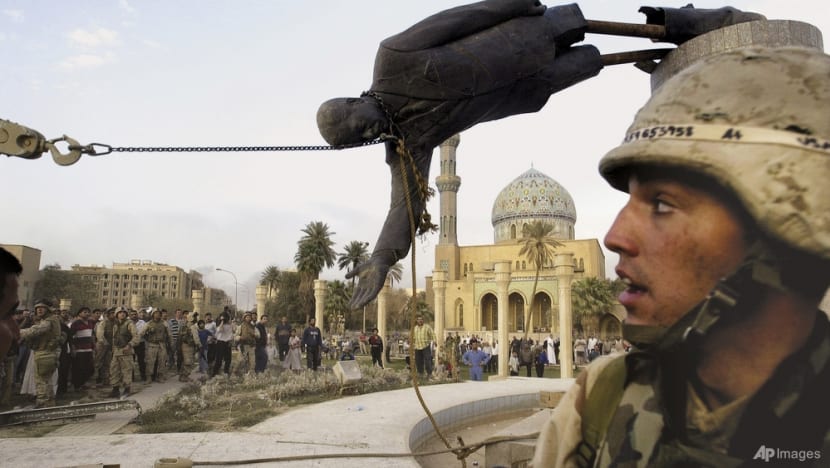Iraq war has drastically altered US views and strategies on warfare, 20 years after invasion, say analysts
An increasing number of Americans are saying the US should not have gotten involved in Iraq, and that the invasion only undermined US influence in the Middle East.

Headstones for soldiers killed in Operation Iraqi Freedom are seen in Section 60 of Arlington cemetery in Arlington, Virginia on March 19, 2023. It has been 20 years since American and coalition forces invaded Iraq on a mission to topple Saddam Hussein’s dictatorship and find weapons of mass destruction. (AFP/Andrew Caballero-Reynolds)
WASHINGTON: Twenty years after the United States’ invasion of Iraq, analysts say the conflict has drastically altered how the US views warfare, and has changed its boots-on-the-ground strategy.
The search for weapons of mass destruction (WMD), along with former Iraqi President Saddam Hussein’s purported ties with terrorist groups, was the pretext and justification for the campaign.
Then-US President George W. Bush called the military operation a mission to free the Iraqi people and to prevent Saddam’s regime from “(threatening) us with the world's most destructive weapons”.
“My fellow citizens, at this hour, American and coalition forces are in the early stages of military operations to disarm Iraq, to free its people and to defend the world from grave danger,” said Bush on March 19, 2003, a day before the US-led invasion of Iraq.
NO WMD FOUND
Within weeks, the US had toppled Saddam’s government, but American troops became bogged down in years of fighting insurgents. Building a stable democracy in the war-torn nation proved just as challenging.
A final report by the US Central Intelligence Agency (CIA) two years after the invasion found no stockpiles of nuclear, chemical or biological weapons.
In 2011, the US announced an end to operations in Iraq.
“As promised, the rest of our troops in Iraq will come home by the end of the year. After nearly nine years, America’s war in Iraq will be over,” said then-US President Barack Obama, on October 21, 2011.
CONSEQUENCES OF THE WAR
A failure to find any WMD and the loss of thousands of US troops in a prolonged conflict soured many Americans’ support for what the Bush administration called a “war on terror”.
Many military analysts argue the withdrawal of US troops resulted in the rise of the Islamic State, and emboldened Iran to extend its influence in the region.

“There were elements of success and elements of failure,” said Mark Cancian, a senior adviser at Washington-based think tank Center for Strategic and International Studies.
“I think most people looking back on it would say we should not have done that, they would not do it again just because of the long campaign that resulted.”
WANING US INFLUENCE
Twenty years on, the impact of the Iraq war is still felt.
An increasing number of Americans are saying the US should not have gotten involved in Iraq, and that the invasion only undermined US influence in the Middle East. The latest example of that waning influence was seen earlier this month when Iran and Saudi Arabia re-established relations in a deal brokered not by the US, but by China.
The Iraq war also created a reluctance to put US boots on the ground in conflicts like Russia's invasion of Ukraine, and the WMD debacle has led to a lingering caution to act solely on intelligence – something which Cancian said will have a bearing on how the US responds to any possible threats to Taiwan.
“I think there would still be a lot of scepticism about taking action before the Chinese actually conduct some clear operations,” said Cancian, who is also a retired marine colonel.
“I think if the intelligence community came to the president and said their assessment is the Chinese are going to attack Taiwan, there would be a lot of push back, (a wait-and-see on) how it unfolds, and a reluctance to take aggressive action just on the basis of the intelligence.”












